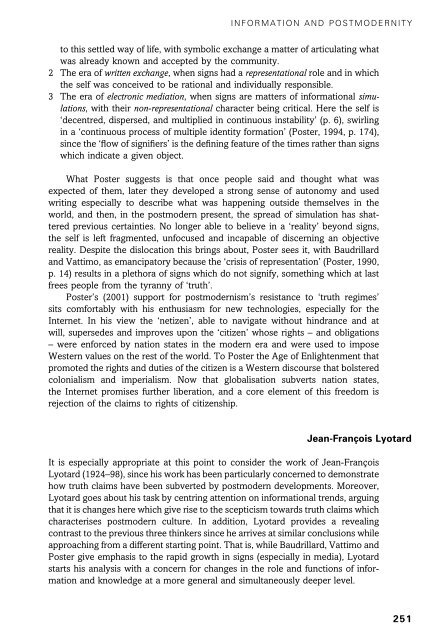Theories of the Information Society, Third Edition - Cryptome
Theories of the Information Society, Third Edition - Cryptome
Theories of the Information Society, Third Edition - Cryptome
Create successful ePaper yourself
Turn your PDF publications into a flip-book with our unique Google optimized e-Paper software.
INFORMATION AND POSTMODERNITY<br />
1<br />
1<br />
1<br />
2<br />
1<br />
to this settled way <strong>of</strong> life, with symbolic exchange a matter <strong>of</strong> articulating what<br />
was already known and accepted by <strong>the</strong> community.<br />
2 The era <strong>of</strong> written exchange, when signs had a representational role and in which<br />
<strong>the</strong> self was conceived to be rational and individually responsible.<br />
3 The era <strong>of</strong> electronic mediation, when signs are matters <strong>of</strong> informational simulations,<br />
with <strong>the</strong>ir non-representational character being critical. Here <strong>the</strong> self is<br />
‘decentred, dispersed, and multiplied in continuous instability’ (p. 6), swirling<br />
in a ‘continuous process <strong>of</strong> multiple identity formation’ (Poster, 1994, p. 174),<br />
since <strong>the</strong> ‘flow <strong>of</strong> signifiers’ is <strong>the</strong> defining feature <strong>of</strong> <strong>the</strong> times ra<strong>the</strong>r than signs<br />
which indicate a given object.<br />
What Poster suggests is that once people said and thought what was<br />
expected <strong>of</strong> <strong>the</strong>m, later <strong>the</strong>y developed a strong sense <strong>of</strong> autonomy and used<br />
writing especially to describe what was happening outside <strong>the</strong>mselves in <strong>the</strong><br />
world, and <strong>the</strong>n, in <strong>the</strong> postmodern present, <strong>the</strong> spread <strong>of</strong> simulation has shattered<br />
previous certainties. No longer able to believe in a ‘reality’ beyond signs,<br />
<strong>the</strong> self is left fragmented, unfocused and incapable <strong>of</strong> discerning an objective<br />
reality. Despite <strong>the</strong> dislocation this brings about, Poster sees it, with Baudrillard<br />
and Vattimo, as emancipatory because <strong>the</strong> ‘crisis <strong>of</strong> representation’ (Poster, 1990,<br />
p. 14) results in a plethora <strong>of</strong> signs which do not signify, something which at last<br />
frees people from <strong>the</strong> tyranny <strong>of</strong> ‘truth’.<br />
Poster’s (2001) support for postmodernism’s resistance to ‘truth regimes’<br />
sits comfortably with his enthusiasm for new technologies, especially for <strong>the</strong><br />
Internet. In his view <strong>the</strong> ‘netizen’, able to navigate without hindrance and at<br />
will, supersedes and improves upon <strong>the</strong> ‘citizen’ whose rights – and obligations<br />
– were enforced by nation states in <strong>the</strong> modern era and were used to impose<br />
Western values on <strong>the</strong> rest <strong>of</strong> <strong>the</strong> world. To Poster <strong>the</strong> Age <strong>of</strong> Enlightenment that<br />
promoted <strong>the</strong> rights and duties <strong>of</strong> <strong>the</strong> citizen is a Western discourse that bolstered<br />
colonialism and imperialism. Now that globalisation subverts nation states,<br />
<strong>the</strong> Internet promises fur<strong>the</strong>r liberation, and a core element <strong>of</strong> this freedom is<br />
rejection <strong>of</strong> <strong>the</strong> claims to rights <strong>of</strong> citizenship.<br />
Jean-François Lyotard<br />
1<br />
It is especially appropriate at this point to consider <strong>the</strong> work <strong>of</strong> Jean-François<br />
Lyotard (1924–98), since his work has been particularly concerned to demonstrate<br />
how truth claims have been subverted by postmodern developments. Moreover,<br />
Lyotard goes about his task by centring attention on informational trends, arguing<br />
that it is changes here which give rise to <strong>the</strong> scepticism towards truth claims which<br />
characterises postmodern culture. In addition, Lyotard provides a revealing<br />
contrast to <strong>the</strong> previous three thinkers since he arrives at similar conclusions while<br />
approaching from a different starting point. That is, while Baudrillard, Vattimo and<br />
Poster give emphasis to <strong>the</strong> rapid growth in signs (especially in media), Lyotard<br />
starts his analysis with a concern for changes in <strong>the</strong> role and functions <strong>of</strong> information<br />
and knowledge at a more general and simultaneously deeper level.<br />
251
















